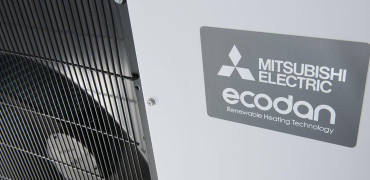Help from nature, scientists and the Government is desperately needed if we are to make the right investment decisions
Walking around the small coastal town where I moved to just over three years ago, I never cease to be amazed by the lack of solar panels on residential property roofs despite our much higher than average sunshine hours enjoyed each year.
It’s the same in the surrounding countryside where very few farmers have turned their fields (or their barn roofs) over to solar panels.
Talking to my new neighbours and friends, I also find that very few of them have installed heat pumps to warm their homes, with the vast majority still relying on gas boilers, or in some cases on oil, wood burners or even coal fires for their heating.
All of which use fossil fuels and they release vast quantities of carbon gases into the atmosphere when in use.
It’s not just about the money required to pay for the changes
Lacking the means
My neighbours are almost all very aware of the threats from climate change due to the very obvious changes in our environment – whether it’s from the heavier rainfall, the more regular flooding of farmland, rivers and property, or the changes in when our seasons start and finish compared to the recent past.
They also understand the links between their energy use and the changing climatic patterns.
In fact they would nearly all like to reduce their carbon footprints, but they lack the means to deliver on this laudable cause.
It seems only my wealthier neighbours have been able to make the necessary changes, but it’s not just about the money required to pay for the changes.
Most of my neighbours don’t know which is the best home improvement for them to make, what change would work best for them, where they can get free and independent advice, and so on.
Decision making kicked into the long grass
A number of them have already upgraded their home insulation (using grants and other financial schemes such as low interest loans), even more of them have upgraded their windows and doors to exclude draughts.
But almost without exception, they are all keen to do more – if only they knew what to do and whether they could afford it.
Their long-term ambitions are being stymied by short term financial pressures and ignorance.
Looking at the slow progress being made in delivering the infrastructure changes necessary to deliver on our net zero carbon emissions targets, it appears my newly adopted hometown is pretty typical of the situation in so many towns, villages and cities all over the country.
Recently the stormy weather endured this Winter and Spring has meant wind power has been providing large amounts of the electricity produced across Britain. It could even contribute a lot more, but the jury is still out on whether people (and their political representatives) are willing to see more wind turbines installed onshore or out at sea.
When you live in a beautiful landscape, these issues can be more difficult to reconcile and overcome. In fact we often kick them into the long grass waiting for a dramatic intervention from ‘others’ or in the vain hope that either the problem will simply go away or that another (less intrusive) solution will magically appear.
This was the 10th consecutive monthly record in a warming phase that has shattered all previous records
What is the answer?
So what are we to do, if we are serious about reducing our carbon gas emissions?
The answer to this question is becoming more and more urgent with the news that we appear to be enduring a dangerously long period of global over-heating, with successive months of abnormally high temperatures recorded worldwide.
While we complain about the terrible weather that spoiled the Easter holidays for many, the Copernicus Climate Change Service released data showing that Global surface temperatures in March were 0.1C higher than the previous record for the month, set in 2016, and 1.68C higher than the pre-industrial average.
This was in fact the 10th consecutive monthly record in a warming phase that has shattered all previous records.
Over the past 12 months, average global temperatures have been 1.58C above pre-industrial levels.
Climate scientists are hoping and praying this is an El Niño-related hangover rather than a symptom of worse-than-expected planetary health. Normally, the affects of an overactive El Niño season are over by August, so the scientists will not have long to wait before they get an answer to that particular concern.
Increasing heat pump orders
Meanwhile our Government is trumpeting the success of its Boiler Upgrade Scheme. Figures released at the end of March showed that applications for heat pump grants rose by 75% in February compared to the same month in 2023.
This marks the fourth month in a row that there have been more than 2,000 applications since grants for air source and ground source heat pumps increased to £7,500. It means the monthly average for applications received between November 2023 and February 2024 is 45% higher than the monthly average before the grant uplift.
Now that looks like a spectacular increase and one that confounds the gloomy picture I was painting above.
But it also shows us that despite the scheme being one of the most generous in Europe, we are in fact moving from an extremely low base, so relatively small increases in the numbers of new heat pumps installed looks spectacularly good when measured in percentages.
But I mustn’t be pessimistic or a naysayer, so let’s have a look at what the politicians and industry experts have to say.
Lord Callanan, the Minister for Energy Efficiency and Green Finance, commented: “Demand for heat pumps is soaring, as we make it easier than ever to make the switch to electric heating without big upfront costs. Our boosted £7,500 grants are helping people create a warm home and lower their emissions. And with applications up 75%, it’s clear our approach is hugely popular with many families.”
Indeed there is further good news. Up to the end of February, the scheme had paid out close to £127 million in vouchers to customers. Other recent changes made to the Boiler Upgrade Scheme criteria, should make heat pumps cheaper and easier to install. Householders will no longer have to install cavity wall or loft insulation to use the scheme, potentially reducing the costs associated with installing a heat pump on a semi-detached property by around £2,500.
Homeowners can also get support to improve their energy efficiency through the Great British Insulation Scheme and Energy Company Obligation (ECO), which are set to help up to 700,000 families install home improvements such as insulation by March 2026.
Long awaited advice published
The Government has also published a guide for potential heat pump owners, where industry experts answer frequently asked questions on heat pumps and their installation.
Charlotte Lee, CEO of the Heat Pump Association said: “It’s great to see the sustained increase and interest in the Boiler Upgrade Scheme since the grant uplift in October 2023, alongside the publication of a government guide for potential heat pump owners which will help to increase the awareness of heat pumps, from a trusted source.”
That all sounds extremely positive and a reason for more optimism.
But a more cautionary tone was struck by Greg Jackson, the Founder of Octopus Energy, who said: “While heat pumps are about four times more efficient than old fashioned gas boilers, the UK is still way behind other countries.”
He was referring to the fact we were a late convert to the heat pump versus traditional boilers argument and we lag well behind other European countries in the numbers of heat pumps installed to date.
Meanwhile the Government’s official target is still for 600,000 heat pump installations per year to be achieved by 2028, despite a lack of capacity to deliver this number and a shortage of qualified installers.
It is also calling for the Competition and Markets Authority to conduct a review of the home heating appliance market to understand whether any weakness in competition is contributing to prices being higher than they would be in a well-functioning market.
Four big players dominate the market, being responsible for about 90% of new boiler sales and installations in people’s homes. This could of course make heat pumps more attractive to many.
The Government has also deferred the implementation of the Clean Heat Market Mechanism until 2025, adjusting the launch from 1 April 2024 to 1 April 2025, by which time we will in all probability have a new Government with different policies and priorities.
More help is still needed
Responding to these policy changes, Stew Horne, head of policy at the Energy Saving Trust said: “These announcements paint a mixed picture both for consumers and the industry. Confirmation that the Clean Heat Market Mechanism is to be delayed is disappointing as this would play an important role in reducing the upfront cost of heat pumps for households. By contrast, removing barriers to help increase take up of Boiler Upgrade Scheme funding is a positive step.
“However, people will still need help to identify what’s right for their homes and that’s why providing access to impartial, personalised advice needs to play a key role in accelerating the roll-out of heat pumps. Finally, there’s still a lack of policies which bring down the running cost of heat pumps to make them more attractive to consumers than gas boilers. The price of electricity must be lowered by removing legacy support costs from electricity bills and improving flexible energy incentives so homes can use electricity when it’s cheapest.”
And that’s where we come full circle to the original picture I was painting.
There clearly is an appetite within the public and in Government to make changes, but we really do need more help to make the right decisions for our homes and our children’s futures. We also need some help from nature! Energy prices could also play their part.
Overall, I’m beginning to feel more optimistic that positive changes will bring about reductions in our emissions, but the speed of our change needs to speed up, with far more emphasis being placed on information giving and advice for householders and in developing the capacity for the heat pump market to deliver at much higher volumes.
And then there’s the question about what we’re doing about the rented stock which makes up almost 40% of our housing. The private rental sector could prove to be a particularly tough nut to crack!
Patrick Mooney is News editor, Housing Management & Maintenance




